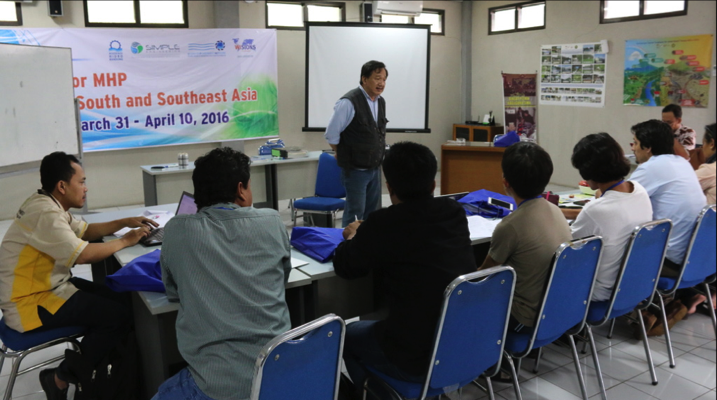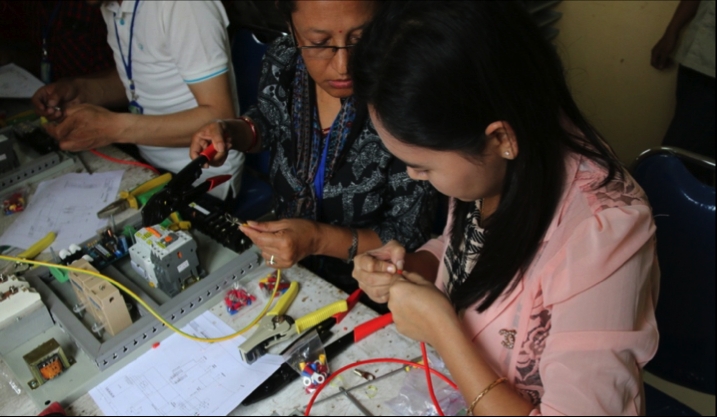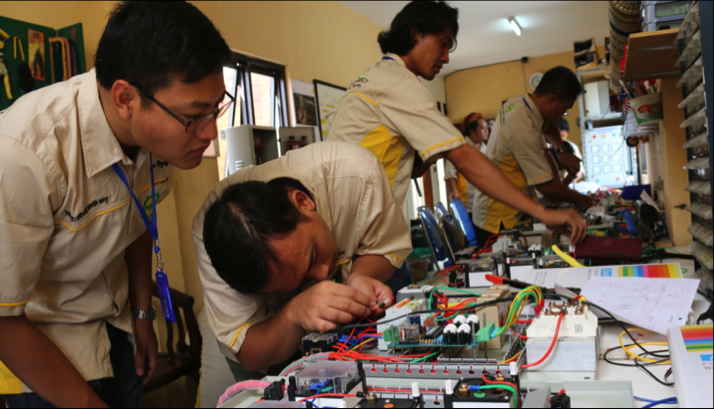This exchange activity aimed to increase the capacity of local engineers and technicians to deal with electronic load controller operation and maintenance
Exchange Need & Objective(s)
Electronic Load Controllers (ELC) are a crucial component of micro-hydropower (MHP) systems. Whereas technicians trained in the maintenance of turbines, generators, transmission lines and other MHP system components tend to be available locally, technicians trained in the electronics of load controllers are often lacking. The Hydro Empowerment Network (HPNET) – a network of South and Southeast Asian MHP practitioners set up in 2013 with support from WISIONS – sees this gap in skills as a key barrier to the sustainable operation of decentralised MHP systems.
This exchange activity strengthened the capacity for ELC-related trouble-shooting among South and Southeast Asian MHP technicians. The activity was based on a previous exchange activity in 2014, which created a baseline study on the state of the art and needs for MHP load controllers in seven different countries (India, Indonesia, Malaysia, Myanmar, Nepal, Pakistan and the Philippines).
- Carry out a bottom-up survey of information and experiences from members of the HPNET on the ELC-related skills gap.
- Train MHP technicians on the electronic and electromechanical aspects of ELCs, so that they may transfer these skills to other technicians in the field (training of trainers) .
- Develop tools for training at local level as well as a system for tracking changes in current skill gaps.
Participants & Target Group(s)
HPNET member Asosiasi Hidro Bandung (AHB) coordinated the work and together with Simple Engineering imparted the technical training. The target trainees were local engineers working in various community-based MHP projects of eleven HPNET member organisations, as well as a number of informally trained local technicians. Participants represented micro hydro programs in Indonesia (2 sub-regions), India (2 sub-regions), Malaysia, Myanmar (2 sub-regions), Nepal, Pakistan, and the Philippines (2 sub-regions).Activities
The project as a whole spanned nine months and culminated in a 12-day training course in Bandung, Indonesia, which took place in early April 2016. The course included lectures, practical hands-on sessions on assembly, installation and trouble-shooting, a dialogue with suppliers, peer-to-peer discussions, a final exam, and a field visit. Except for plenary lectures, all activities were done in small groups. In addition to the pre-set curriculum, each participant had a chance to focus on topics of their choice. This included evening sessions on programming devices for ELC integrated circuit chips, using the Arduino control board, and learning about the latest available sensors.
The course focused on matching the skills to the different levels of knowledge of participants, customising the contents as much as possible. At the end of each day, participants provided feedback and this was used to ensure the curriculum remained relevant for all. The trainee feedback also served to test and improve the course training materials, which were then adapted for use as self-learning tools and which were disseminated via HPNET member organisations. They will also be made available on the HPNET website.
Lastly, great focus was put on triggering the follow up local trainings that would take the knowledge learnt back to the projects in the field. At the time of reporting, participants from India, Myanmar, Pakistan, and the Philippines had either completed their first local training or had scheduled it for 2016. The participants from Malaysia and Indonesia, who already have MHP training centers, planned to incorporate ELC training into their curricula.
Results & Impact
The exchange was very productive and greatly increased the capacity of local technicians from HPNET member organizations and other community-based partner organisations to deal with ELC operation and maintenance in the context of community-based MHP systems. This will in turn increase the reliability of current and future MHP systems, reducing the rate of failures resulting from lack of skills related to ELCs. Efforts were made within the exchange to develop a common tracking tool for HPNET members to monitor how ELC-related knowledge gaps change and what more can be done to address failures due to ELCs.
Efforts were made within the exchange to develop a common tracking tool for HPNET members to monitor how ELC-related knowledge gaps change and what more can be done to address failures due to ELCs.
Lessons Learned
The appropriate selection of trainees and instructors was the determining factor for the success of the exchange. There was strong commitment and flexibility from the part of trainees and instructors participants felt free to ask questions and contribute with their own experience. Each trainee had his or her own strengths, helping to raise the level of knowledge of the entire group.
The project aimed to match the capacity building programm and the training tools to MHP practitioners of different backgrounds and levels of education. In the future the curriculum could be improved by splitting the participants into three groups, namely project engineers, local technicians, and community operators.
One major unexpected outcome of the activity was the valuable insights that were gathered from technicians to support the ongoing innovation efforts in the field of ELCs among the participating organisations. For example, it emerged that in Myanmar there is strong interest from both the government and the private sector to develop proprietary ELC and flow controllers. HPNET as a whole is geared towards developing an "open source“ controller, exploring inverter-based and micro-processor based controllers. These and other aspects were object of discussion during the course of the exchange. The organisers would like to follow up on and support the participants' desire to jointly design and develop an open source ELC.
As a next step, HPNET will target other skill gaps that are currently slowing the dissemination of MHP systems, be it among consumers, operators, engineers, or suppliers. Moreover it will create basic fact sheets for researchers, advocacy groups, and donors.
Project Summary SL_E003

Projects with same technology
Exchange: Technology Transfer on Pico-Hydro in South and Southeast Asia
To transfer Sri Lankan pico-hydro turbine manufacturing skills to micro-hydro practitioner organisations in Bangladesh, the Philippines, Myanmar and Malaysia
Hybridisation of an Existing Micro Hydro Plant with Solar PV and Integration with the Grid
The project aims to integrate an existing micro hydro power unit into the national grid to prevent it from becoming non-operational and to demonstrate the potential of a grid-connected micro hydro solar hybrid system. Solar power will ensure the reliability of export of power to the grid during dry season while micro hydro becomes partly functional.
Projects in same country
Knowledge Exchange on the Energy Delivery Model Participatory Approach to Designing Energy Services
Awareness-raising and capacity building for relevant stakeholders in Indonesia on participatory approaches to energy project design.
Implementation of Low Head Micro Hydro to Support Clean Water Supply for a Boarding School
This project aims to install a 10 kW low-head Micro-Hydro Plant (MHP) along a riverside, generating power for a nearby school
